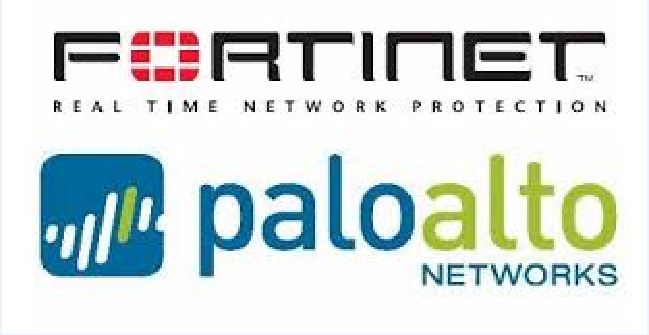Fortinet and Palo Alto Networks provide firewalls as physical appliances and cloud solutions. Both companies boast impressive product lines and innovations in networking security. Both vendors offer next-generation firewalls (NGFW) that work in a security fabric to protect the network edge at all scales. They include full visibility, advanced threat protection, granular application control, natively integrated proxy, SD-WAN support and automation-driven management.
NGFW
Fortinet and Palo Alto Networks are highly rated by users and in independent testing, but they offer slightly different features. Fortinet is the industry leader in NGFWs, offering a robust security platform that delivers a full feature set and advanced protection capabilities. These include a strong cluster management solution, AI/ML-powered FortiGuard services, fully managed threat hunting and granular control of SaaS applications, natively integrated proxy, SD-WAN optimization and hyper-scale security, centralized network security administration and more. The NGFW can also advance inspection techniques beyond traditional firewalls’ basic stateful inspection.
This includes IP reputation checking and a deeper examination of data packets to determine the contents and identify potential threats. It is also capable of detecting malicious traffic and blocking it from entering your network, which prevents the lateral spread of malware and other threats that could potentially compromise your data. Fortinet’s NGFWs are powered by the latest security processor technology, which can support the high-performance security workloads required to protect against today’s most dangerous attacks. This is important because many of the newest attack techniques need significant resources to analyze and dissect. The ability of the NGFW to quickly and efficiently process this data allows it to detect these threats in seconds rather than the minutes or hours typical with a traditional firewall.
Management
Another firewall comparison between Fortigate and PAN is that Fortinet NGFW is a next-generation firewall offering higher visibility and advanced threat protection than Palo Alto. It is designed to secure networks at the edge and protect against lateral threats inside the network. This firewall also provides centralized management and cloud-delivered security services. Its security fabric and PAN-OS software provide powerful networking security and protection against cyber threats.
It can detect unsanctioned applications and hidden dangers, preventing lateral threat propagation. It also allows for granular control over SaaS applications and SSL decryption capacity. Its centralized management system gives administrators visibility of their network, simplifies their IT operations, and makes it easier to document activities and ensure compliance standards are met. It also increases performance and reduces administrative overhead and IT costs. It also improves security posture and enables the enterprise to scale its security infrastructure more easily.
In addition to centralized management, Fortinet’s firewall provides AI/ML-based threat intelligence from FortiGuard Labs and deep analytics through its FortiAnalyzer platform. It also features SD-WAN capabilities, enabling it to deliver secure, efficient performance with minimal degradation in throughput. Its security architecture can be deployed as a hardware appliance, virtual machine or in the cloud (public, private and hybrid). It is also compatible with multivendor environments. This makes it an excellent choice for large enterprises and mid-sized businesses.
Endpoint Protection
Increasingly, business systems and intellectual property are being stored on employee devices. When these devices are compromised, the results can be devastating. Breaches can cost companies millions in ransomware payments, operational disruption, business loss, regulatory fines, increased insurance premiums and damaged customer trust. Endpoint protection can prevent these breaches, saving companies significantly more than the average $4 million cost.
A good solution can detect stealthy malware, living off-the-land attacks, Active Directory credential theft and other threats that evade standard prevention. It can also provide rapid detection and response to security incidents involving compromised endpoints. This allows CISOs to focus on the more high-value activities that require their expertise. The best solutions have cloud-based architectures that are quick to deploy, easy to manage and scalable to fit the needs of growing businesses.
They should provide granular visibility and control and be able to identify and prioritize threats and incidents automatically. They should also offer automated response capabilities to reduce the need for human intervention and enable CISOs to scale their operations without hiring additional personnel. Both Fortinet and Palo Alto Networks NGFWs score well in independent testing (Software Testing) and have extensive product portfolios that can meet the needs of nearly any organization. Fortinet is better suited to appliance-based distributed enterprise and branch office needs, while Palo Alto has a stronger edge in cloud, container and FWaaS use cases.
IPS
When a threat is detected, the IPS reacts immediately without your input. It’s always on and working, so you can rest assured that your network is safe. It combines powerful machine learning and AI tools to identify vulnerabilities that traditional software might miss. It scans every portion of your network architecture to find points of weakness that could be exploited. It can then patch those vulnerabilities so that hackers can’t gain access to sensitive information or take over your systems.
The NGFW can also block unsanctioned applications and hidden threats, preventing lateral threat propagation by detecting and blocking devices that are infected with malware. This can stop data breaches, ransomware, and other cyber attacks. The NGFW can stop zero-day and highly evasive threats thanks to its advanced security features like the FortiEDR and endpoint protection functionality. It can also protect your business from threats that use tunneling to escape detection. The NGFW is also highly rated in independent testing and offers various hardware options for different needs.





